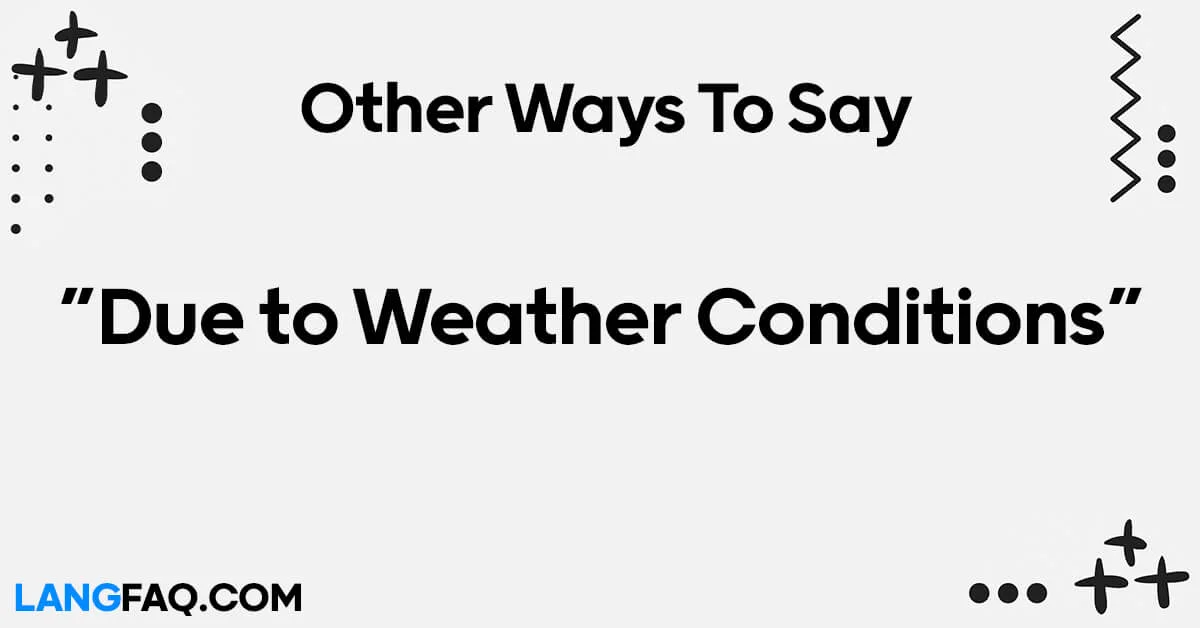Welcome to an exploration of language nuances! Weather is a universal topic, but sometimes expressing its impact can feel repetitive. Fear not! We’re here to enrich your vocabulary with 12 unique alternatives to the phrase “due to weather conditions”. Let’s dive into the linguistic adventure of conveying meteorological effects with flair and finesse.
12 Other Ways to Say “Due to Weather Conditions”
Here are 12 alternative ways to say “due to weather conditions”:
- Owing to atmospheric influences
- As a result of meteorological factors
- Because of inclement weather
- On account of adverse climate conditions
- Thanks to the prevailing atmospheric state
- Due to the elements’ impact
- As a consequence of weather patterns
- With the weather being the determining factor
- In light of prevailing weather phenomena
- As a result of climatic variations
- Because of atmospheric changes
- In response to weather-related circumstances
| Alternative Phrase | Meaning | Example |
|---|---|---|
| Owing to atmospheric influences | Because of the effects of the atmosphere | The flight was delayed owing to atmospheric influences. |
| As a result of meteorological factors | Due to the conditions of the weather | The event was canceled as a result of meteorological factors. |
| Because of inclement weather | Due to unfavorable or severe weather | The picnic was postponed because of inclement weather. |
| On account of adverse climate conditions | Due to unfavorable climate circumstances | The crop yield was low on account of adverse climate conditions. |
| Thanks to the prevailing atmospheric state | Due to the current state of the atmosphere | The roads were slippery thanks to the prevailing atmospheric state. |
| Due to the elements’ impact | Because of the influence of natural elements | The power outage was due to the elements’ impact. |
| As a consequence of weather patterns | Resulting from the patterns of weather | The flooding was as a consequence of weather patterns. |
| With the weather being the determining factor | Weather being the deciding factor | The outdoor event was canceled with the weather being the determining factor. |
| In light of prevailing weather phenomena | Taking into consideration the current weather events | The decision to postpone the game was made in light of prevailing weather phenomena. |
| As a result of climatic variations | Due to changes in climate | The increase in hurricanes is as a result of climatic variations. |
| Because of atmospheric changes | Due to alterations in the atmosphere | The temperature drop was because of atmospheric changes. |
| In response to weather-related circumstances | Reacting to weather-related situations | The evacuation was in response to weather-related circumstances. |
In summary, there are numerous alternative phrases to express “due to weather conditions,” each offering a nuanced way of describing the impact of the weather on various situations. By diversifying our language, we can enhance communication and convey the intricacies of weather-related phenomena more effectively.
Is It Correct to Say “Due to Weather Conditions”?
Yes, “due to weather conditions” is a correct phrase in English. It is commonly used to indicate that something is happening or has happened because of the state of the weather.
For example:
- “The flight was delayed due to weather conditions.”
- “The event was canceled due to weather conditions.”
- “The outdoor picnic was moved indoors due to weather conditions.”
This phrase effectively communicates the impact of weather on a situation or event, emphasizing that the weather is the cause or reason for a particular outcome. It is widely used in both formal and informal contexts to explain weather-related disruptions or changes in plans.
Professional Mail Example With “Due to Weather Conditions”
Subject: Update on [Event/Meeting] – Rescheduling Due to Weather Conditions
Dear [Recipient’s Name],
I hope this email finds you well. I am writing to inform you about a change in plans regarding our upcoming [event/meeting] scheduled for [date/time].
Due to weather conditions forecasted for [date], including [brief description of weather forecast], we have made the decision to reschedule the [event/meeting] to ensure the safety and well-being of all participants.
The new date and time for the [event/meeting] will be [new date] at [new time]. We believe that this adjustment will allow us to proceed with the [event/meeting] under more favorable weather conditions, ensuring a positive experience for everyone involved.
We apologize for any inconvenience this change may cause and appreciate your understanding and flexibility in this matter. If you have any questions or concerns, please feel free to reach out to [contact person or department].
Thank you for your attention to this matter, and we look forward to seeing you at the rescheduled [event/meeting].
Best regards,
[Your Name] [Your Position/Title] [Your Contact Information]
Owing to Atmospheric Influences
When we say something is “owing to atmospheric influences,” we’re attributing a certain outcome or effect to the conditions of the atmosphere at a particular time and place. This phrase is often used in more formal contexts, such as scientific reports, weather forecasts, or technical discussions about environmental factors.
Definition and Usage
According to the Cambridge Dictionary, “owing to” means “because of.” Therefore, “owing to atmospheric influences” essentially means “because of the effects of the atmosphere.” This phrase is typically employed to explain how weather conditions or atmospheric phenomena have contributed to a specific event or situation.
Examples and Scenarios
In a professional setting, you might use this phrase in a meteorological report: “The delay in air traffic was owing to atmospheric influences, including heavy fog and reduced visibility.”
In an academic paper discussing climate change, you could write: “The fluctuations in regional temperatures are owing to atmospheric influences driven by greenhouse gas emissions.”
Variations and Tips
When communicating with colleagues or professionals in related fields, using “owing to atmospheric influences” can demonstrate precision and technical expertise. However, when discussing weather-related issues in more casual settings, such as with friends or family, it may be more appropriate to use simpler language, such as “because of the weather.”
Grammar and Usage
It’s important to note that “owing to” is a formal phrase and is not commonly used in everyday conversation. Therefore, it’s essential to consider the context and audience when deciding whether to use this phrase. In formal writing or presentations, it can add clarity and specificity to your explanation of weather-related phenomena.
Conclusion
In summary, “owing to atmospheric influences” provides a concise and precise way to attribute specific outcomes or effects to the conditions of the atmosphere. Whether you’re discussing weather patterns, environmental changes, or scientific research findings, this phrase can help convey complex concepts with clarity and accuracy. However, it’s essential to use it judiciously and consider the context in which it’s being used to ensure effective communication.
Email Sample:
Subject: Update on Flight Delays
Dear [Recipient],
I wanted to inform you that there will be a delay in our flight schedule today. The current situation at the airport is owing to atmospheric influences, including heavy fog and reduced visibility. As a result, flights are being rescheduled to ensure passenger safety.
We apologize for any inconvenience this may cause and appreciate your understanding.
Best regards, [Your Name]
As a Result of Meteorological Factors
“As a result of meteorological factors” is another formal way of saying that something is happening because of the weather conditions at the time. This phrase is commonly used in scientific or technical discussions about the impact of weather on various phenomena.
Definition and Usage
The phrase “as a result of” means “because of,” so when we say “as a result of meteorological factors,” we’re indicating that the current situation or outcome is directly influenced by the weather conditions.
Examples and Scenarios
In a report on agricultural yields, you might write: “The decrease in crop production this year is as a result of meteorological factors such as prolonged drought and irregular rainfall patterns.”
In a conversation with colleagues about construction delays, you could say: “The postponement of the building project is as a result of meteorological factors like extreme temperatures and high winds, which have made outdoor work unsafe.”
Variations and Tips
While “as a result of meteorological factors” is appropriate for formal or technical discussions, it may sound overly formal in casual conversations. In everyday language, you can simplify it to “because of the weather” or “due to weather conditions” to make your point more accessible to a broader audience.
Grammar and Usage
Using “as a result of meteorological factors” adds specificity and scientific precision to your explanation of how weather conditions are impacting a particular situation. However, it’s essential to consider the audience and context to ensure that the language used is appropriate for the situation.
Conclusion
“As a result of meteorological factors” is a formal and precise way to attribute outcomes or effects to specific weather conditions. Whether you’re writing a scientific report, presenting research findings, or discussing weather-related issues in a professional setting, this phrase can help convey the direct impact of weather on various phenomena. Just remember to adjust your language based on the context and audience to ensure effective communication.
Email Sample:
Subject: Construction Project Update
Dear Team,
I wanted to provide an update on the construction project. Unfortunately, we are experiencing delays as a result of meteorological factors. The current weather conditions, including heavy rainfall and thunderstorms, have made it unsafe for outdoor work to proceed as planned.
We are monitoring the situation closely and will adjust the schedule accordingly. Thank you for your patience and understanding.
Best regards, [Your Name]
Because of Inclement Weather
“When we talk about ‘because of inclement weather,’ we’re referring to adverse or severe weather conditions that are causing disruptions or difficulties. This phrase is commonly used in both formal and informal contexts to explain the impact of harsh weather on various activities or events.
Definition and Usage
The term “inclement weather” refers to unpleasant or severe weather conditions, such as heavy rain, snow, strong winds, or extreme temperatures. Therefore, saying something is happening “because of inclement weather” means it’s due to the challenging weather conditions at the time.
Examples and Scenarios
In a formal announcement about event cancellations, you might say: “The outdoor concert has been postponed because of inclement weather, including heavy rain and lightning.”
In a casual conversation with friends about weekend plans, you could mention: “We had to cancel our hiking trip because of inclement weather forecasted for Saturday.”
Variations and Tips
While “because of inclement weather” is suitable for both formal and informal situations, you can adapt the language depending on the context. For instance, in professional emails or announcements, you may use more formal language, while in everyday conversations, you can simplify it to “bad weather” or “terrible weather.”
Grammar and Usage
Using “because of inclement weather” adds specificity and clarity to your explanation of why certain activities or events are affected by the weather. It helps convey the seriousness of the weather conditions and the impact they’re having on plans or schedules.
Conclusion
“Inclement weather” is a versatile phrase that can be used in various contexts to explain disruptions or difficulties caused by adverse weather conditions. Whether you’re making formal announcements, discussing plans with friends, or writing emails about event cancellations, this phrase effectively communicates the challenges posed by severe weather. Remember to adjust your language based on the audience and context to ensure clear and effective communication.
Email Sample:
Subject: Event Postponement Notice
Dear Attendees,
Due to inclement weather conditions forecasted for tomorrow, we regret to inform you that the outdoor charity event has been postponed. Heavy rain and thunderstorms are expected, posing safety concerns for participants and volunteers.
We apologize for any inconvenience this may cause and will provide updates on the rescheduled date as soon as possible. Thank you for your understanding and support.
Best regards, [Event Organizer]
On Account of Adverse Climate Conditions
“On account of adverse climate conditions” is a formal way of saying that something is happening because of unfavorable or challenging climate circumstances. This phrase is often used in scientific reports, environmental discussions, or formal announcements about the impact of climate change.
Definition and Usage
The term “adverse climate conditions” refers to unfavorable or detrimental weather patterns or environmental factors that can affect ecosystems, societies, or economies. Saying something is happening “on account of adverse climate conditions” means it’s due to the negative effects of the prevailing climate on a particular situation or outcome.
Examples and Scenarios
In a research paper on agriculture and food security, you might write: “The decline in crop yields is on account of adverse climate conditions, including prolonged droughts and soil degradation.”
In a formal presentation about environmental conservation efforts, you could say: “The urgency of our actions is underscored by the need to mitigate the impacts of biodiversity loss on account of adverse climate conditions.”
Variations and Tips
“While ‘on account of adverse climate conditions’ is appropriate for formal or technical discussions, it may sound overly formal in casual conversations. In everyday language, you can simplify it to ‘because of the climate’ or ‘due to adverse weather’ to make your point more accessible to a broader audience.
Grammar and Usage
Using “on account of adverse climate conditions” adds specificity and technical precision to your explanation of how climate factors are impacting a particular situation or outcome. However, it’s essential to consider the context and audience to ensure that the language used is appropriate for the situation.
Conclusion
“On account of adverse climate conditions” is a formal and precise way to attribute outcomes or effects to specific climate factors. Whether you’re writing scientific reports, presenting research findings, or discussing climate-related issues in a professional setting, this phrase can help convey the direct impact of climate on various phenomena. Just remember to adjust your language based on the context and audience to ensure effective communication.
Email Sample:
Subject: Update on Environmental Conservation Efforts
Dear Stakeholders,
I wanted to provide an update on our environmental conservation efforts. The urgency of our actions is underscored by the need to mitigate the impacts of biodiversity loss on account of adverse climate conditions. Prolonged droughts, soil degradation, and habitat destruction are threatening ecosystems worldwide, highlighting the importance of our collective efforts to address climate change.
We appreciate your continued support and commitment to environmental sustainability.
Best regards, [Your Name]
Thanks to the Prevailing Atmospheric State
When we mention “thanks to the prevailing atmospheric state,” we are acknowledging that a particular situation or outcome is influenced by the current conditions of the atmosphere. This phrase is often used in formal contexts, such as scientific research papers, weather reports, or technical discussions about environmental factors.
Definition and Usage
The term “prevailing atmospheric state” refers to the dominant or prevailing weather conditions at a given time and place. Saying something is happening “thanks to the prevailing atmospheric state” means it’s because of the prevailing weather conditions influencing that particular outcome.
Examples and Scenarios
In a scientific study on air quality, you might write: “The increase in air pollution levels is thanks to the prevailing atmospheric state, characterized by stagnant air masses and low wind speeds.”
In a technical report on aviation operations, you could state: “Flight delays are expected thanks to the prevailing atmospheric state, with heavy fog and reduced visibility affecting airport operations.”
Variations and Tips
While “thanks to the prevailing atmospheric state” is suitable for formal contexts, you may opt for simpler language in casual conversations or everyday writing. For instance, you can say “because of the weather conditions” or “due to the prevailing weather” to convey the same meaning more informally.
Grammar and Usage
Using “thanks to the prevailing atmospheric state” adds specificity and technical accuracy to your explanation of how weather conditions are influencing a particular situation or outcome. It helps highlight the direct impact of atmospheric conditions on various phenomena, particularly in scientific or technical discussions.
Conclusion
“Thanks to the prevailing atmospheric state” offers a precise and formal way to attribute outcomes or effects to specific weather conditions. Whether you’re writing scientific reports, presenting research findings, or discussing weather-related issues in a professional setting, this phrase can effectively convey the direct influence of atmospheric conditions. Just remember to adjust your language based on the context and audience to ensure clear and effective communication.
Email Sample:
Subject: Air Quality Update
Dear [Recipient],
I wanted to provide an update on the current air quality situation. Unfortunately, the increase in pollution levels is thanks to the prevailing atmospheric state, characterized by stagnant air masses and low wind speeds. We are closely monitoring the situation and implementing measures to address air quality concerns in affected areas.
Thank you for your attention to this matter.
Best regards, [Your Name]
Due to the Elements’ Impact
When we attribute something to “the elements’ impact,” we’re acknowledging the influence of natural forces, such as weather patterns or environmental conditions, on a particular situation or outcome. This phrase can be used in both formal and informal contexts to explain the effects of natural phenomena on various activities or events.
Definition and Usage
The term “the elements” refers to the fundamental forces of nature, including weather, climate, and geological factors. Saying something is happening “due to the elements’ impact” means it’s because of the influence of these natural forces on the situation or outcome.
Examples and Scenarios
In a news report about infrastructure damage, you might read: “The road closures are due to the elements’ impact, with heavy rainfall causing flooding and landslides in the area.”
In a casual conversation with friends about camping plans, you could say: “We had to cancel the trip due to the elements’ impact – the forecast is calling for thunderstorms all weekend.”
Variations and Tips
While “due to the elements’ impact” is suitable for both formal and informal contexts, you may adjust the language based on the audience and setting. For instance, in professional communications, you can use more formal language, while in casual conversations, you can simplify it to “because of the weather” or “thanks to nature.”
Grammar and Usage
Using “due to the elements’ impact” adds specificity and acknowledgment of natural forces to your explanation of a situation or outcome. It helps emphasize the role of weather or environmental conditions in influencing events or activities, whether in formal reports or everyday conversations.
Conclusion
“Due to the elements’ impact” provides a versatile and inclusive way to attribute outcomes or effects to natural forces. Whether you’re discussing infrastructure damage, outdoor activities, or environmental phenomena, this phrase effectively conveys the influence of the elements on various aspects of life. Just remember to adapt your language based on the context and audience to ensure effective communication.
Email Sample:
Subject: Road Closures Update
Dear Residents,
I wanted to provide an update on the current road closures in the area. The closures are due to the elements’ impact, with heavy rainfall causing flooding and landslides in several locations. Our maintenance crews are working diligently to assess and address the situation as quickly as possible.
Thank you for your understanding and cooperation during this time.
Best regards, [Your Name]
As a Consequence of Weather Patterns
When we say something is “as a consequence of weather patterns,” we’re indicating that a particular outcome or situation is a direct result of the prevailing patterns or trends in the weather. This phrase is commonly used in formal contexts, such as scientific research papers, climate change discussions, or technical reports analyzing meteorological data.
Definition and Usage
The term “weather patterns” refers to the recurring sequences or trends in weather conditions over a specific period in a particular region. Saying something is happening “as a consequence of weather patterns” means it’s a result of the consistent or recurrent weather phenomena observed in that area.
Examples and Scenarios
In a climate change report, you might read: “The increase in extreme weather events is as a consequence of weather patterns shifting due to global warming.”
In a scientific study on agricultural productivity, you could state: “Crop failures are occurring as a consequence of weather patterns characterized by erratic rainfall and prolonged droughts.”
Variations and Tips
While “as a consequence of weather patterns” is appropriate for formal contexts, you may opt for simpler language in casual conversations or everyday writing. For instance, you can say “because of the weather trends” or “due to consistent weather conditions” to convey the same meaning more informally.
Grammar and Usage
Using “as a consequence of weather patterns” adds specificity and technical accuracy to your explanation of how weather conditions are influencing a particular situation or outcome. It helps highlight the direct impact of consistent weather phenomena on various aspects of life, particularly in scientific or technical discussions.
Conclusion
“As a consequence of weather patterns” offers a precise and formal way to attribute outcomes or effects to specific trends or sequences in the weather. Whether you’re writing scientific reports, presenting research findings, or discussing climate-related issues in a professional setting, this phrase can effectively convey the direct influence of weather patterns. Just remember to adjust your language based on the context and audience to ensure clear and effective communication.
Email Sample:
Subject: Climate Change Impact Update
Dear [Recipient],
I wanted to provide an update on the latest findings regarding climate change impacts in our region. The increase in extreme weather events, including hurricanes, droughts, and heatwaves, is as a consequence of weather patterns shifting due to global warming. It’s crucial that we continue to prioritize mitigation and adaptation measures to address these challenges.
Thank you for your attention to this matter.
Best regards, [Your Name]
With the Weather Being the Determining Factor
When we mention “with the weather being the determining factor,” we’re emphasizing that a particular decision or outcome hinges entirely on the prevailing weather conditions at the time. This phrase can be used in both formal and informal contexts to explain how weather influences various activities, events, or decisions.
Definition and Usage
The term “determining factor” refers to the primary or decisive element that influences a particular situation or outcome. Saying something is happening “with the weather being the determining factor” means that the weather conditions are the key factor driving that particular decision or outcome.
Examples and Scenarios
In a formal announcement about event cancellations, you might read: “The outdoor wedding has been postponed, with the weather being the determining factor due to forecasts of heavy rain and thunderstorms.”
In a casual conversation with friends about weekend plans, you could say: “We decided to have a movie night indoors, with the weather being the determining factor – it’s too cold to go out!”
Variations and Tips
While “with the weather being the determining factor” is suitable for both formal and informal contexts, you may adjust the language based on the audience and setting. For instance, in professional communications, you can use more formal language, while in casual conversations, you can simplify it to “because of the weather” or “thanks to nature.”
Grammar and Usage
Using “with the weather being the determining factor” adds emphasis and clarity to your explanation of how weather conditions influence a particular decision or outcome. It helps highlight the significance of weather in driving certain actions or choices, whether in formal announcements or everyday conversations.
Conclusion
“With the weather being the determining factor” provides a clear and concise way to explain how weather conditions influence decisions or outcomes. Whether you’re making formal announcements, discussing plans with friends, or writing emails about event cancellations, this phrase effectively communicates the decisive role of weather in various situations. Just remember to adapt your language based on the context and audience to ensure effective communication.
Email Sample:
Subject: Event Postponement Notice
Dear Attendees,
We regret to inform you that the outdoor charity event scheduled for this weekend has been postponed, with the weather being the determining factor. Forecasts predict heavy rain and thunderstorms, posing safety concerns for participants and volunteers.
We apologize for any inconvenience this may cause and will provide updates on the rescheduled date as soon as possible.
Best regards, [Event Organizer]
In Light of Prevailing Weather Phenomena
When we refer to a situation being “in light of prevailing weather phenomena,” we’re acknowledging that the current weather conditions or events are influencing a particular decision, action, or perspective. This phrase is often used in formal contexts, such as scientific research papers, weather forecasts, or technical reports analyzing meteorological data.
Definition and Usage
The term “prevailing weather phenomena” refers to the dominant or recurring weather events or conditions at a given time and place. Saying something is happening “in light of prevailing weather phenomena” means it’s being considered or evaluated based on the existing weather conditions or events.
Examples and Scenarios
In a scientific study on climate change adaptation strategies, you might read: “The development of resilient infrastructure is essential in light of prevailing weather phenomena, including increased frequency and intensity of extreme weather events.”
In a weather forecast update, you could state: “Outdoor activities are discouraged in light of prevailing weather phenomena, with forecasts of heavy rain and gusty winds throughout the day.”
Variations and Tips
While “in light of prevailing weather phenomena” is suitable for formal contexts, you may opt for simpler language in casual conversations or everyday writing. For instance, you can say “considering the weather conditions” or “given the current weather situation” to convey the same meaning more informally.
Grammar and Usage
Using “in light of prevailing weather phenomena” adds specificity and technical accuracy to your explanation of how weather conditions are influencing a particular decision, action, or perspective. It helps emphasize the significance of considering weather-related factors in various contexts, particularly in scientific or technical discussions.
Conclusion
“In light of prevailing weather phenomena” offers a formal and precise way to acknowledge the influence of weather conditions or events on decisions, actions, or perspectives. Whether you’re writing scientific reports, presenting research findings, or discussing weather-related issues in a professional setting, this phrase effectively communicates the importance of considering weather-related factors. Just remember to adjust your language based on the context and audience to ensure clear and effective communication.
Email Sample:
Subject: Weather Update and Safety Advisory
Dear Residents,
We wanted to provide an update on the current weather situation and issue a safety advisory. Outdoor activities are discouraged in light of prevailing weather phenomena, with forecasts of heavy rain and gusty winds throughout the day. Please exercise caution and avoid unnecessary travel or outdoor activities until the weather conditions improve.
Your safety is our top priority, and we appreciate your cooperation during this time.
Best regards, [Your Name]
As a Result of Climatic Variations
When we say something is happening “as a result of climatic variations,” we’re acknowledging that changes or fluctuations in climate conditions are influencing a particular outcome or situation. This phrase is often used in formal contexts, such as scientific research papers, climate change discussions, or technical reports analyzing long-term climate trends.
Definition and Usage
The term “climatic variations” refers to changes or fluctuations in climate conditions over an extended period, typically decades or centuries. Saying something is happening “as a result of climatic variations” means it’s directly influenced by the long-term changes or trends observed in climate patterns.
Examples and Scenarios
In a scientific study on biodiversity loss, you might read: “The decline in species diversity is occurring as a result of climatic variations, including shifts in temperature and precipitation patterns.”
In a policy briefing on climate resilience, you could state: “Investments in infrastructure upgrades are necessary as a result of climatic variations, such as sea-level rise and increased frequency of extreme weather events.”
Variations and Tips
While “as a result of climatic variations” is suitable for formal contexts, you may opt for simpler language in casual conversations or everyday writing. For instance, you can say “due to climate changes” or “because of shifting climate patterns” to convey the same meaning more informally.
Grammar and Usage
Using “as a result of climatic variations” adds specificity and technical accuracy to your explanation of how long-term changes in climate conditions are influencing a particular outcome or situation. It helps emphasize the significance of considering climate-related factors in various contexts, particularly in scientific or technical discussions.
Conclusion
“As a result of climatic variations” offers a formal and precise way to attribute outcomes or effects to changes or fluctuations in climate conditions. Whether you’re writing scientific reports, presenting research findings, or discussing climate-related issues in a professional setting, this phrase effectively communicates the direct influence of long-term climate trends. Just remember to adjust your language based on the context and audience to ensure clear and effective communication.
Email Sample:
Subject: Climate Resilience Policy Briefing
Dear Colleagues,
I wanted to provide a briefing on our climate resilience policy efforts. Investments in infrastructure upgrades are necessary as a result of climatic variations, such as sea-level rise and increased frequency of extreme weather events. It’s crucial that we prioritize adaptation measures to mitigate the impacts of shifting climate patterns on our communities and ecosystems.
Thank you for your attention to this important matter.
Best regards, [Your Name]
Because of Atmospheric Changes
When we attribute something to “because of atmospheric changes,” we’re acknowledging that alterations in the Earth’s atmosphere are influencing a particular outcome or situation. This phrase can be used in both formal and informal contexts to explain the effects of changes in atmospheric conditions on various activities, events, or phenomena.
Definition and Usage
The term “atmospheric changes” refers to alterations or modifications in the composition, pressure, temperature, or other properties of the Earth’s atmosphere. Saying something is happening “because of atmospheric changes” means it’s directly influenced by shifts or fluctuations in atmospheric conditions.
Examples and Scenarios
In a scientific study on air quality, you might read: “The increase in air pollution levels is because of atmospheric changes, including higher concentrations of greenhouse gases and pollutants.”
In a news report about weather anomalies, you could state: “The unusual heatwave gripping the region is because of atmospheric changes, with high-pressure systems and warm air masses dominating the area.”
Variations and Tips
While “because of atmospheric changes” is suitable for both formal and informal contexts, you may adjust the language based on the audience and setting. For instance, in professional communications, you can use more formal language, while in casual conversations, you can simplify it to “due to changes in the atmosphere” or “because of shifting weather patterns.”
Grammar and Usage
Using “because of atmospheric changes” adds specificity and acknowledgment of natural forces to your explanation of a situation or outcome. It helps emphasize the role of atmospheric conditions in influencing events or activities, whether in formal reports or everyday conversations.
Conclusion
“Because of atmospheric changes” provides a versatile and inclusive way to attribute outcomes or effects to alterations in the Earth’s atmosphere. Whether you’re discussing air quality, weather anomalies, or climate phenomena, this phrase effectively conveys the influence of atmospheric conditions on various aspects of life. Just remember to adapt your language based on the context and audience to ensure effective communication.
Email Sample:
Subject: Air Quality Alert
Dear Residents,
I wanted to alert you to the current air quality situation in our area. The increase in air pollution levels is because of atmospheric changes, including higher concentrations of greenhouse gases and pollutants. It’s important to take precautions, especially for individuals with respiratory conditions or sensitive health issues.
Please take care and limit outdoor activities if possible.
Best regards, [Your Name]
In Response to Weather-Related Circumstances
When we mention “in response to weather-related circumstances,” we’re acknowledging that a particular action or decision is prompted by specific situations or events related to the weather. This phrase can be used in both formal and informal contexts to explain how weather conditions influence various responses, plans, or strategies.
Definition and Usage
The term “weather-related circumstances” refers to situations, events, or conditions that are directly influenced or affected by the weather. Saying something is happening “in response to weather-related circumstances” means it’s a reaction or decision prompted by specific weather-related factors.
Examples and Scenarios
In a safety advisory regarding outdoor activities, you might read: “All outdoor events are canceled in response to weather-related circumstances, including forecasts of severe thunderstorms and lightning.”
In an emergency response plan for natural disasters, you could state: “Evacuation orders are issued in response to weather-related circumstances, such as flooding and storm surge threats.”
Variations and Tips
While “in response to weather-related circumstances” is suitable for both formal and informal contexts, you may adjust the language based on the audience and setting. For instance, in professional communications, you can use more formal language, while in casual conversations, you can simplify it to “because of the weather” or “due to weather conditions.”
Grammar and Usage
Using “in response to weather-related circumstances” adds specificity and acknowledgment of natural forces to your explanation of a situation or decision. It helps emphasize the role of weather conditions in prompting responses or actions, whether in formal announcements or everyday conversations.
Conclusion
“In response to weather-related circumstances” offers a clear and concise way to explain how weather conditions influence decisions, actions, or responses. Whether you’re issuing safety advisories, implementing emergency plans, or communicating changes in outdoor activities, this phrase effectively communicates the direct impact of weather-related factors. Just remember to adjust your language based on the context and audience to ensure effective communication.
Email Sample:
Subject: Outdoor Event Cancellation Notice
Dear Participants,
We regret to inform you that all outdoor events scheduled for this weekend are canceled in response to weather-related circumstances. Forecasts predict severe thunderstorms and lightning, posing safety concerns for participants and staff.
We apologize for any inconvenience this may cause and appreciate your understanding.
Best regards, [Event Organizer]
FAQs:
- What are some other ways to say “due to weather conditions”? Exploring alternative phrases such as “owing to atmospheric influences” or “as a result of meteorological factors” offers fresh perspectives on conveying weather-related impacts.
- How can I enhance my vocabulary related to weather conditions? Engage in reading diverse literature and pay attention to descriptive language used to depict weather phenomena. Additionally, experimenting with alternative phrases in everyday conversations can help expand your repertoire of expressions.
- Why is it important to vary my language when discussing weather conditions? Using diverse language adds richness and depth to your communication, preventing repetition and enhancing clarity. It also allows for more nuanced descriptions of weather phenomena, fostering greater understanding and engagement among listeners or readers.
- Are there cultural differences in how weather is described? Absolutely! Different cultures may have unique idioms or expressions related to weather, reflecting their geographical landscapes, historical experiences, and societal norms. Exploring these cultural nuances can offer fascinating insights into linguistic diversity.
- Can weather idioms be used figuratively in language? Certainly! Many weather-related phrases have found their way into everyday language as metaphors or symbols, conveying emotions, experiences, or situations beyond literal weather conditions. For example, “stormy relationship” or “sunny disposition” are commonly used figuratively.
- Where can I find resources to learn more about weather-related language? Online dictionaries, language forums, and literature focused on meteorology or linguistics are valuable resources for exploring weather-related vocabulary and expressions.
Conclusion:
In the ever-changing tapestry of language, finding alternative ways to express common phrases enriches communication and fosters creativity. By exploring 12 other ways to say “due to weather conditions”, we’ve embarked on a journey of linguistic discovery, uncovering new perspectives on the natural world around us. So, let’s embrace the diversity of language and celebrate the nuances that make communication a vibrant and dynamic endeavor.







